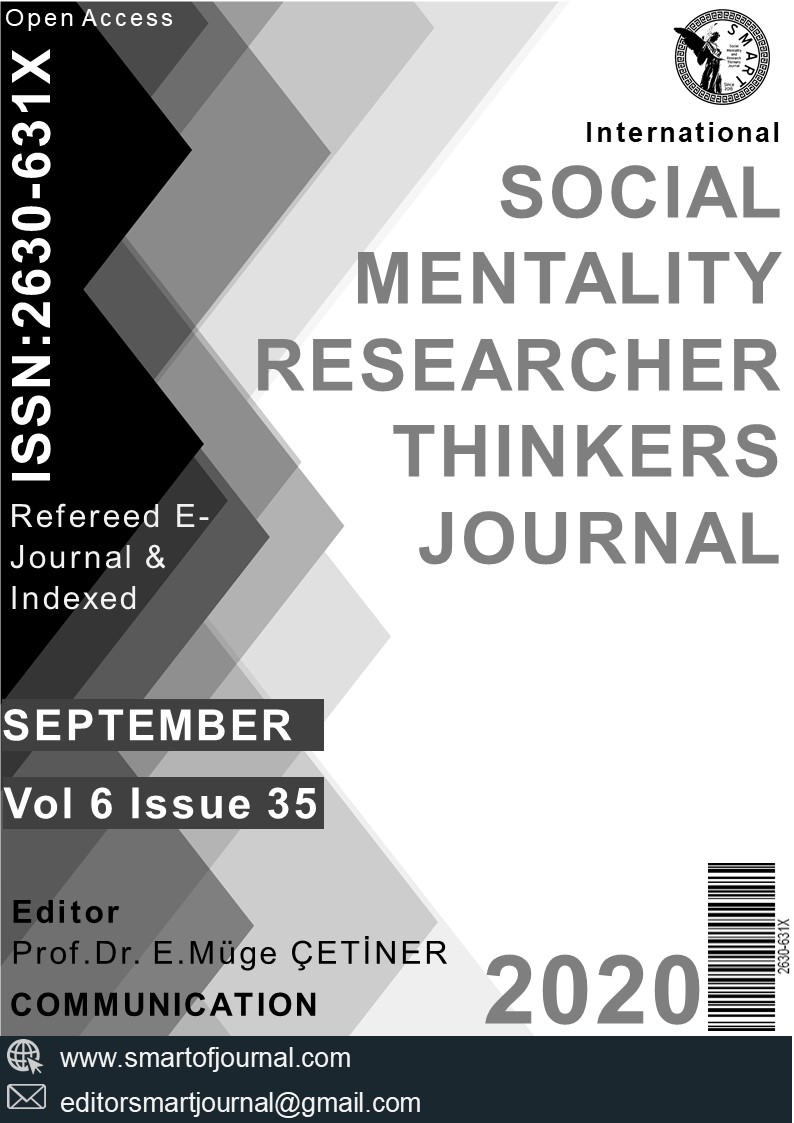Author :
Abstract
Bu araştırmada müzik öğretmenlerinin benlik saygısı düzeyleri farklı değişkenler açısından incelenmiştir. Araştırma, betimsel nitelikte ilişkisel tarama modeline göre yapılmıştır. Çalışmanın verileri Batı Karadeniz Bölgesindeki Milli Eğitim Bakanlığına bağlı resmi ve özel okulların farklı kademelerinde çalışan 125 müzik öğretmeni ile yapılan anketlerden elde edilmiştir. Müzik öğretmenlerinin benlik saygısı düzeylerinin cinsiyet, yaş, hizmet yılı, medeni durum, çalıştığı kurum, haftalık çalgı çalışma süresi, ekonomik durumlarını algılama, öğrenim durumu değişkenlerine göre değişip değişmediği belirlenmiştir. Araştırmada veri toplama aracı olarak 7 sorudan oluşan “Kişisel Bilgi Formu” ve 10 sorudan oluşan “Rosenberg Benlik Saygısı Ölçeği” kullanılmıştır. Bu araştırmadan elde edilen bulgularda müzik öğretmenlerinin benlik saygısı düzeyleri ‘orta’ düzeyde bulunmuştur. Başka bir deyişle, araştırmaya katılan müzik öğretmenlerinin benlik saygısına ilişkin algı düzeyleri çok yüksek olmasa da olumlu düzeyde bulunmuştur. Araştırmaya katılan öğretmenlerin, benlik saygısı düzeylerinin demografik özelliklerine göre farklılık gösterip göstermediğine bakıldığında; öğretmenlerin cinsiyeti, mesleki kıdemi, çalgı çalmaya ayrılan süre ve eğitim durumları benlik saygısı düzeylerinde/puanlarında anlamlı farklılaşmaya neden olurken, medeni durum, çalışılan kurum ve ekonomik durum algısı değişkenleri benlik saygısı düzeylerinde anlamlı farklılaşmaya neden olmadığı sonucuna varılmıştır.
Keywords
Abstract
In this research, the levels of music teachers’ self esteem are studied according to different variables. This is a descriptive research in the relational survey model. The data of the study were obtained from questionnaires conducted with 125 music teachers working at different levels of public and private schools affiliated to the Ministry of National Education in the Western Black Sea Region. It has been determined whether or not the self esteem levels of music teachers vary according to the variables of gender, age, years of service, marital status, institutions of work, weekly practice hours of instruments, perception of economic status and educational status. In the study, “A Personal İnformation Form” consisting of 7 questions and “Rosenberg Self-Esteem Scale” consisting of 10 questions were used as data collection tools. According to the research findings, the self-esteem levels of music teachers were found to be moderate. In other words, the self-esteem perception levels of the music teachers who took part in the study were found to be positive, although not very high. In conclusion, it is seen that the gender, professional seniority, time allocated to practising the instrument and their education status cause a significant difference in their self-esteem levels, while the marital status, institution of work and economic status perception do not cause a meaningful differentiation in their self esteem levels.
Keywords
- Baloğlu, N., Karada, E., Çalışkan, N. ve Korkmaz, T. (2006). İlköğretim öğretmenlerinin meslek
- Baloğlu, N., Karada, E., Çalışkan, N. ve Korkmaz, T. (2006). İlköğretim öğretmenlerinin meslekbenlik saygısı ve doyumları arasındaki ilişkinin değerlendirilmesi. Ahi Evran Üniversitesi Kırşehir Eğitim Fakültesi Dergisi, 7(2), 345-358.
- Bilgiç, R. (1998). The relationship between job satisfaction and personal characteristics of turkish workers. The Journal of Psychology, 132(5), 549-557.
- Büyüköztürk, Ş., Çakmak, E.K., Akgün, Ö.E., Karadeniz, Ş. ve Demirel, F. (2018). Bilimsel araştırma yöntemleri (24. bs.). Ankara: Pegem Yayıncılık
- Dursun, Ö. Ö., Cuhadar, C. ve Tanyeri, T. (2014). Bilişim teknolojileri öğretmen adaylarının mesleki benlik saygıları. Pamukkale Üniversitesi Eğitim Fakültesi Dergisi, 35(35), 131-142.
- Karasar, N. (2017). Bilimsel araştırma yöntemi: kavramlar, ilkeler ve teknikler (32. bs.). Ankara: Nobel Yayınevi.
- Özgüven, İ. E. (2003). Endüstri psikolojisi. Ankara: Pdrem Yayınları.Rosenberg, M. (1965). Conceiving the self. New York: Basic Books.
- Şanlı, S. (2006). Adana ilinde çalışan polislerin iş doyumu ve tükenmişlik düzeylerinin bazıdeğişkenler açısından incelenmesi (Yayımlanmamış yüksek lisans tezi). Çukurova Üniversitesi Sosyal Bilimleri Enstitüsü, Adana.
- Tekirgöl Y. D. (2011). Çalışanlarda mesleki benlik saygısının iş tatmini ve yaşam mutluluğu ileilişkisi (Yayımlanmamış yüksek lisans tezi). Maltepe Üniversitesi Sosyal Bilimler Enstitüsü, İstanbul.
- Zoroğlu, Ö. (2014). Okul öncesi öğretmenlerinin mesleğe yönelik tutumları, mesleki benlik saygılarıile iş doyumları arasındaki ilişki (Yayımlanmamış yüksek lisans tezi). Karadeniz Teknik Üniversitesi Eğitim Bilimleri Enstitüsü, Trabzon.





